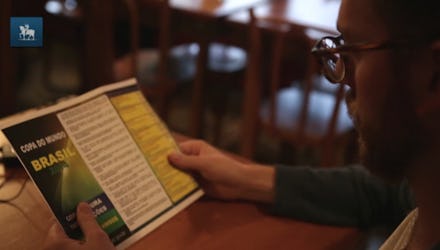Things Are So Bad in Brazil, the Government Is Distributing This Pamphlet to Tourists

The news: "Do not react, scream or argue."
That's how São Paulo police are saying you should handle a mugging if you want to walk away unharmed.
In the lead-up to hosting the World Cup next month, Brazil's security forces are implementing a public awareness campaign to keep tourists safe. Around 600,000 soccer fans are expected in São Paulo for the tournament, and the city's police are worried they won't know how to handle themselves.
So the police department designed pamphlets to advise tourists how to avoid drawing attention to themselves or to their attackers. The leaflets will be published in English, Spanish and French and will be distributed by various embassies and consulates.
"Tourists coming from Europe or the U.S. don't come frequently and aren't used to seeing these types of crimes. Since they're not used to it, they will react to an assault," said police officer Mario Leite. "With the pamphlets, they know not to flaunt certain objects, to be careful at night and to only walk around if accompanied."
Image Credit: Estadao de Sao Paulo
Why this is important: These pamphlets may seem unnecessary and over-reactive, but there's a good reason why the police are giving them out. Latrocinios, or robberies that end in murders, have been on the rise in São Paulo. Last year, they rose 9% to a nine-year high of 385 deaths. Brazil also has one of the highest murder rates in the world, with 25.2 people killed per 100,000.
And oblivious tourists, buzzed from the games and unaware of the city's high crime rates, would make the perfect target. But by not confronting or drawing attention to their robbers, they could prevent provoking further violence — because losing your wallet is nothing compared to losing your life.
But it's kind of backwards: That said, there's something a bit ridiculous about a World Cup and soon-to-be Olympic host nation handling their crime problem by saying, "Don't draw attention to yourself." Instead of actually dealing with the crime, they're effectively telling tourists if they get mugged, it's their own fault. That's practically akin to telling a woman that if she was sexually assaulted, it's because of her provocative dress, or even just because she was outside alone. Of course, Brazil's crime problem is a serious one that won't likely be solved in time for the World Cup, but the situation still rings uncomfortably.
Image Credit: Estadao de Sao Paulo
But Brazil has bigger problems: While latrocinios are certainly disconcerting, there are other issues that have destabilized the country. In its effort to clean out the city for tourists and World Cup spectators, Brazilian police have raided favelas and had violent clashes with the people, which some believe have, on occasion, amounted to human rights abuse.
Around 19,000 families near development sites have been forced to relocate with little notice or compensation, while violent shoot-outs between favela gangs and armed troops have led to civilian deaths.
And there are significant worries that the infrastructure might not even be ready to host the tournament. Two stadiums have not even finished construction, and this week marked the eighth accidental death of a construction worker. Resources have been stretched between this year's World Cup and the 2016 Summer Olympics, stoking rumors that the latter might be relocated from Rio to London.
In anticipation of trouble, Brazil has deployed 30,000 troops to patrol its borders; boats, helicopters and planes will also be employed to crack down on organized crime.
Yet the biggest threat of all might not be robbers or gangs, but the public itself. More than 1 million Brazilians protested in 80 cities last year against the World Cup's $14 billion price tag and against long-standing issues like "corruption, dire public services, high prices and low levels of safety." These demonstrations shed light on Brazil's severe infrastructural problems, and there won't be a pamphlet to guide tourists if and when the protests renew.